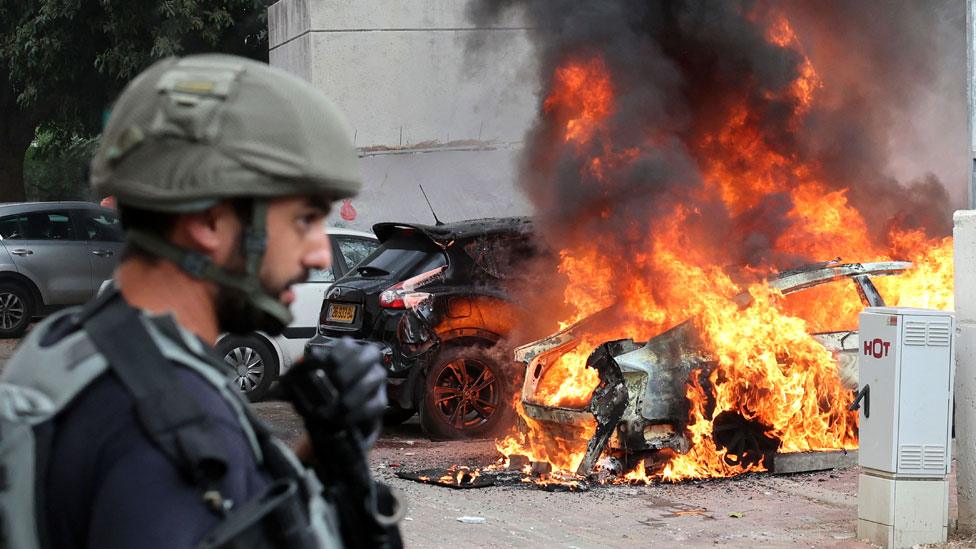President Joe Biden's foreign policy upended by Hamas attack
- Published
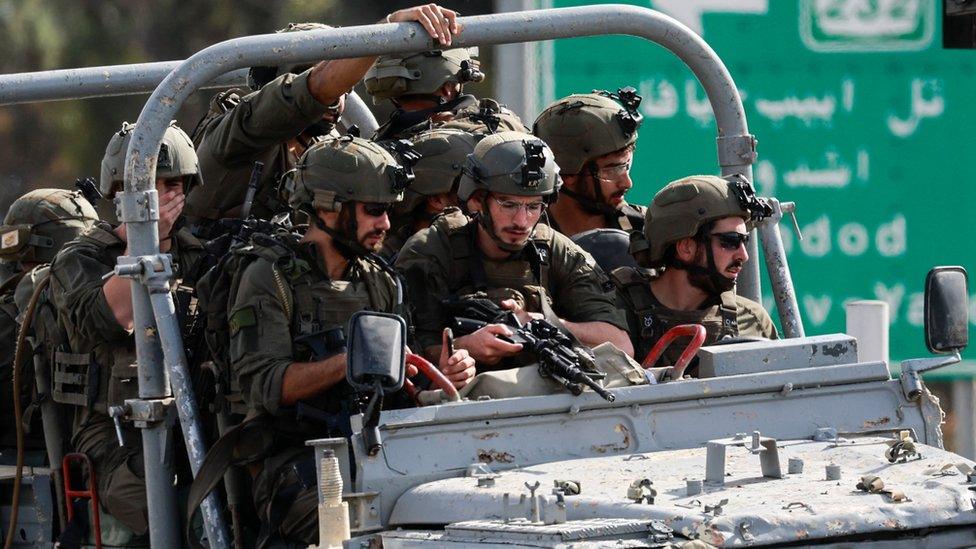
Israeli military drive on a road in the southern part of the country during operations against Hamas fighters
The scope of Hamas's attack against Israel was unprecedented and the US response reflects that.
It already supplies its Middle East ally with $3.8bn (£3.1bn) of military aid every year.
And it has always backed Israel's right to defend itself when conflicts with Hamas erupt, albeit intervening with ceasefire calls after a few days or weeks of Israeli air strikes.
But this Hamas offensive will trigger a wide-ranging Israeli campaign and could lead to an escalation in other parts of the region.
The US will be part of Israel's lengthy and punishing response.
Warships are a show of force
The Pentagon has quickly dispatched an aircraft carrier with guided-missile cruisers and destroyers to the waters near Israel.
The fleet was already in the Mediterranean Sea, so didn't have far to go. It is not unusual for the US to deploy naval vessels in the region when there are flare-ups, a "classic American response to the unexpected in the Middle East," says Bruce Riedel, a former CIA officer and Middle East adviser to four presidents.
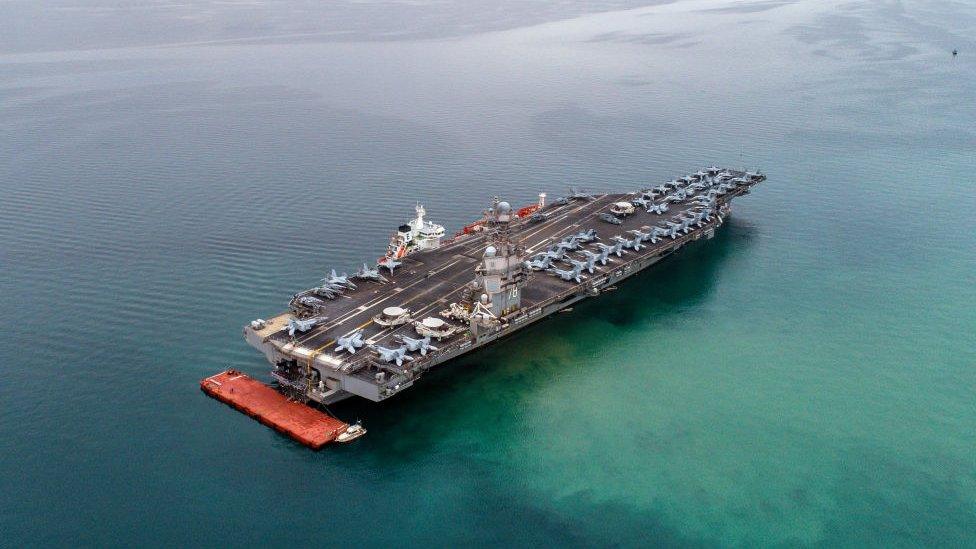
The aircraft carrier USS Gerald R Ford, shown here off the coast of Italy in 2018, is heading to waters near Israel
It hasn't done so during previous battles between Hamas and Israel, which have been self-contained. But this isn't about Hamas. The Pentagon is worried the conflict may spread.
A senior defence official said the warships and planes are meant to demonstrate a concrete commitment to Israel's defence, and to deter any country or militant group from joining the fight.
Chiefly that means Iran, which backs Lebanon's powerful Hizbollah movement, as well as Hamas.
The official said the fleet could do everything from gathering intelligence to launching long range strikes. But its deployment is essentially a show of force.
Giving Israel extra firepower
The Biden administration has ordered the Pentagon to send "additional equipment and resources" to Israel. That includes air defence and munitions.
Much of this equipment is already in the pipeline from annual US military assistance to Israel, and will be fast tracked. Some of it could come from existing US stockpiles.
But Israel's request for aid on the first day of the war signals how much firepower it expects to use in what it's signalling is going to be a long war.
Further funding would require approval from Congress, which is currently paralysed by an internal battle over who will be the next Speaker of the House.
And it might compete with US commitments to Ukraine. These already stand at more than $46bn (£37.5bn) since the war there began - although the senior defence official said the US has the resources to support both.
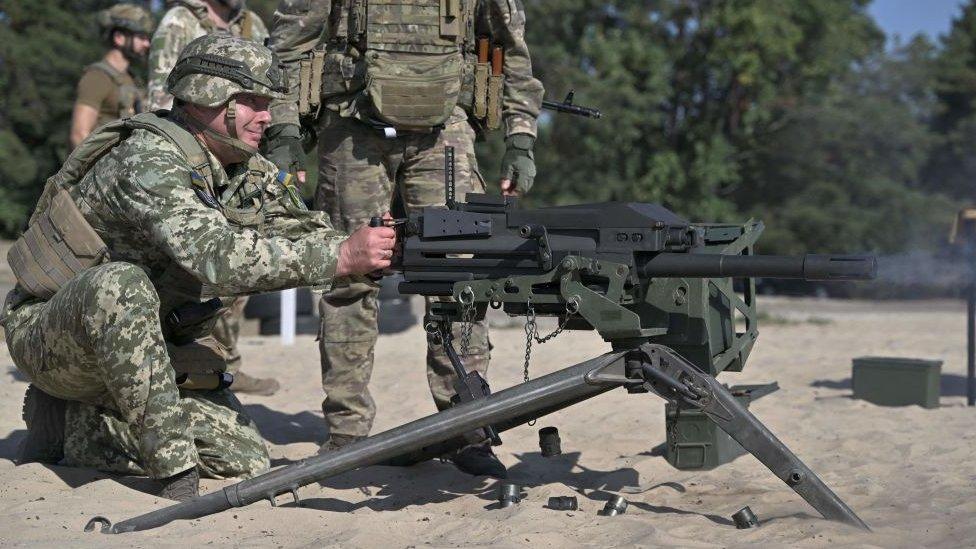
US officials say military aid to Israel won't compete with efforts to arm Ukraine
The risks and calculations
It's unlikely that deploying the aircraft carrier fleet will increase the risk of drawing the US directly into conflict, says Seth Jones, a security analyst at the Center for Strategic and International Studies.
But the urgent attention on Israel "may take some of the focus off of other theatres, like Ukraine," he says, at least in the short term.
A big part of that will be the fate of dozens of hostages captured by Hamas, both in terms of how the conflict plays out on the ground and in US politics.
President Biden has said it's likely American citizens are among them and plans to deploy experts and share intelligence to assist recovery efforts.
More broadly, the war has upended the core of his Middle East policy - a new regional security alignment between Israel and Saudi Arabia that would have further isolated Iran.

More on Hamas-Israel attacks

That deal is now on pause, with a future that may grow even more uncertain if, as expected, Palestinian casualties mount in Gaza.
"That will mean Arab states will have to criticise Israel very strongly," says Bruce Riedel, suggesting some who have already signed normalisation agreements with Israel may "flip".
That concern was implicit in the Pentagon's characterisation of the attack as a new "Isis-level savagery" from Hamas.
The Department of Defense is stressing that language because across the region "there's been an instinct to see this as the same kind of tensions or conflicts that we've seen between Palestinians and Israelis," said the defence official. "This is different."
Where the US will draw the line
A lot of Palestinians in Gaza will die if Israel carries out a lengthy and ferocious air and possibly ground campaign to dismantle Hamas.
In previous battles between Israel and the militant group, which governs the densely populated enclave, the US has eventually drawn a line, urging Israel to accept a ceasefire. But the goalposts have changed.
No Arab state has ever imposed this kind of civilian damage on Israel, says Mr Riedel. The surprise attack from Egypt and Syria in 1973 was just as much of a shock, but most of the casualties were soldiers.
"Now they're fighting inside Israel proper," he says, with hundreds of civilians dead.
According to the senior defence official, the US holds Israel to robust standards and monitoring procedures for the protection of civilians, applied to all who purchase US weapons.
But, the official said, "that's absolutely something that Hamas did not do" and "we recognize that there's going to need to be a response for Israel to restore deterrence".
Watch: Driving through Gaza's streets
Related topics
- Published9 October 2023

- Published9 October 2023
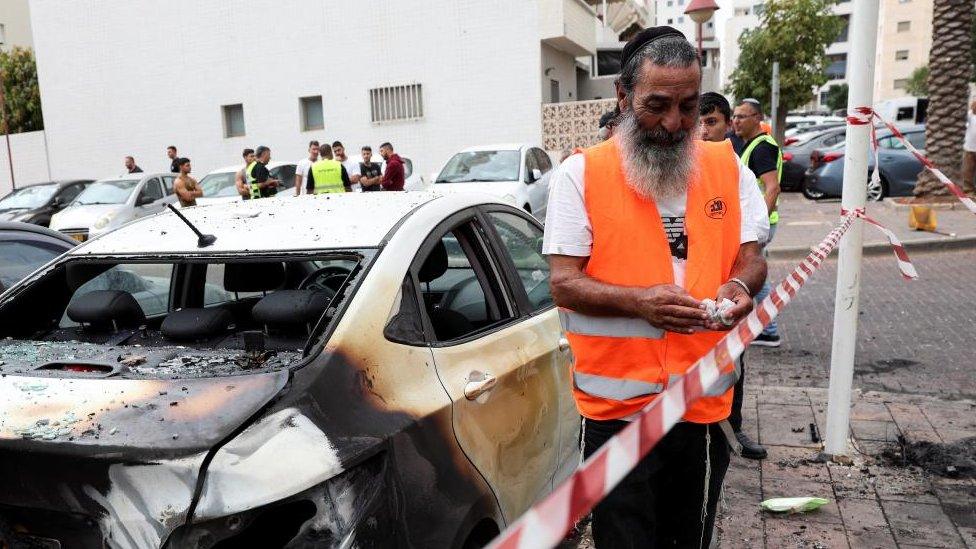
- Published9 October 2023
